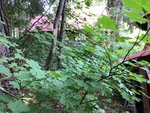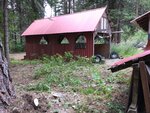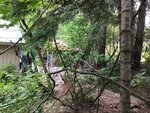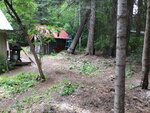



CHELAN COUNTY – This summer, Cascadia Conservation District (Cascadia CD) started offering a free fuels reduction program to residents from Cashmere to Lake Wenatchee who may face physical, financial, or other barriers to reducing wildfire fuels around their homes.
“We've done a lot of work around here, but it was still out of hand. There's just so much stuff on the forest floor that we couldn't keep up with it,” said Peshastin resident Harry Link. “They really did a good job. We have forests all the way around us, and they went out, probably 100 feet from the house…cut some trees down, and got all the brush away.”
Link had slowly chipped away at his property for years, but was met with physical limitations from working with concrete for 40 years. A crew contracted by Cascadia CD cleaned up their yard in about three days of work.
“The idea is to make this type of work more available, so kind of breaking down those barriers that folks might have to getting this kind of work done,” said Program Manager Isobel Woolner.
Cascadia CD has historically offered fuels reduction assistance through its Fuel Break and Forest Resilience Partnership Program. This cost share program typically provides financial assistance for about 50 to 80 percent of the project. Yet, Cascadia CD realized there was a need for a more affordable option in order to address a large part of Chelan County.
“Wildfire resilience is really a community kind of effort. Our risk is a community risk. Fire doesn't look at property boundaries…The more people we can turn the risk factor down on for their property, the safer everybody will be,” said Woolner.
Under the program, Cascadia CD visits the property, then makes a “prescription” for its contracted crews to thin brush, prune tree limbs, and remove debris such as leaves and pine needles within 100 feet of the home.
“There's three main drivers of fire behavior: weather, topography, and fuels. You can't influence the weather. Topography you may be able to have a little bit of control over, but probably not much. So fuels, that third component, is the thing that we have control over, and the thing, that component, that we can influence,” said Woolner.
According to the National Fire Protection Association, embers and small flames are the main reason a majority of homes ignite in wildfire, and their likelihood of ignition largely has to do with the condition of the Home Ignition Zone (HIZ), which extends out up to 200 feet from the foundation. The fuels reduction program work focuses on the three management zones in the HIZ: the immediate zone (zero to five feet), intermediate zone (five to 30 feet), and extended zone (30 to 100 feet).
The program is fully funded by the Conservation Commission, allowing Cascadia CD to contract the work out to Lake Wenatchee Fire and Rescue (LWFR), Chelan County Fire District #3 (CCFD #3), or Ecological Services.
“It aligns with everything we're trying to accomplish…We started out mostly doing egress pathways and things like that. It was ultimately our goal to start doing defensible space work on private property for our citizens. And so when [Cascadia CD] approached us, that really kind of solved the problem for us of where the funding for that was going to come from,” said CCFD #3 Deputy Chief Mike Smith.
Jackie Haskins, who owns 20 acres off Mountain Home Road, saw her neighbors participating in wildfire resiliency efforts, and decided to call Cascadia CD. CCFD #3 was assigned to the project.
“If I would say, ‘Well, what would you do in this scenario?’ They would give me their opinion. But if I would say, ‘No, that tree I don't want to limp up, because the grouse lives under there. But yes, limb up these other five,’ they would, no questions asked,” said Haskins.
CCFD #3 crews worked collaboratively with Haskins to clear the area around her home and along a shared road within four days of work. The work inspired Haskins to sign up for additional programs to address the remainder of her property.
“I've been chipping away at it by myself, tree by tree, year by year…I mean, in four days, they did as much as I could do in a couple years working by myself, and it's just such a morale booster. I do work on my place all the time, but to get that jump start now, I'm really excited to do more on my own,” said Haskins.
Those interested in fuels reduction work can reach out to Woolner at 509-312-8555 or isobelw@cascadiacd.org. Cascadia CD also offers assistance in Spanish.
Taylor Caldwell: 509-433-7276 or taylor@ward.media
Comments
No comments on this item Please log in to comment by clicking here